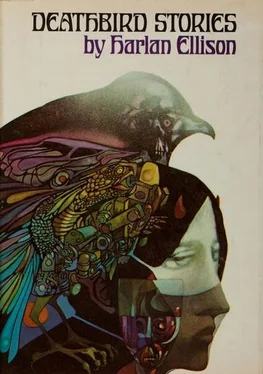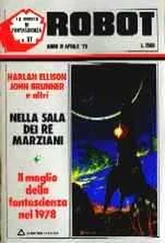“Before you met me. What is it now?”
Snake.
Something slithered past the mouth of the cave. It did not stop, but it called out with voice of moist mud sucking down into a quagmire.
“Why did you put me down there? Why did you come to me in the first place? What spark? Why can’t I remember these other lives or who I was? What do you want from me?”
You should sleep. It will be a long climb. And cold.
“I slept for two hundred and fifty thousand years, I’m hardly tired,” Stack said. “Why did you pick me?”
Later. Now sleep. Sleep has other uses.
Darkness deepened around Snake, seeped out around the cave, and Nathan Stack lay down near the warming-stone, and the darkness took him.
13
SUPPLEMENTARY READING
This is an essay by a writer. It is clearly an appeal to the emotions. As you read it, ask yourself how it applies to the subject under discussion. What is the writer trying to say? Does he succeed in making his point? Does this essay cast light on the point of the subject under discussion? After you have read this essay, using the reverse side of your test paper, write your own essay (500 words or less) on the loss of a loved one. If you have never lost a loved one, fake it.
AHBHU
Yesterday my dog died. For eleven years Ahbhu was my closest friend. He was responsible for my writing a story about a boy and his dog that many people have read. The story was made into a successful movie. The dog in the movie looked a lot like Ahbhu. He was not a pet, he was a person. It was impossible to anthropomorphize him, he wouldn’t stand for it. But he was so much his own kind of creature, he had such a strongly formed personality, he was so determined to share his life with only those he chose, that it was also impossible to think of him as simply a dog. Apart from those canine characteristics into which he was locked by his genes, he comported himself like one of a kind.
We met when I came to him at the West Los Angeles Animal Shelter. I’d wanted a dog because I was lonely and I’d remembered when I was a little boy how my dog had been a friend when I had no other friends. One summer I went away to camp and when I returned I found a rotten old neighbor lady from up the street had had my dog picked up and gassed while my father was at work. I crept into the woman’s backyard that night and found a rug hanging on the clothesline. The rug beater was hanging from a post. I stole it and buried it.
At the Animal Shelter there was a man in line ahead of me. He had brought in a puppy only a week or so old. A Puli, a Hungarian sheep dog; it was a sad-looking little thing. He had too many in the litter and had brought in this one either to be taken by someone else or to be put to sleep. They took the dog inside and the man behind the counter called my turn. I told him I wanted a dog and he took me back inside to walk down the line of cages.
In one of the cages the little Puli that had just been brought in was being assaulted by three larger dogs that had been earlier tenants. He was a little thing, and he was on the bottom, getting the stuffing knocked out of him. But he was struggling mightily.
“Get him out of there!” I yelled. “I’ll take him, I’ll take him, get him out of there!”
He cost two dollars. It was the best two bucks I ever spent.
Driving home with him, he was lying on the other side of the front seat, staring at me. I had had a vague idea what I’d name a pet, but as I stared at him, and he stared back at me, I suddenly was put in mind of the scene in Alexander Korda’s 1939 film The Thief of Bagdad , where the evil vizier, played by Conrad Veidt, had changed Ahbhu, the little thief, played by Sabu, into a dog. The film had superimposed the human over the canine face for a moment so there was an extraordinary look of intelligence in the face of the dog. The little Puli was looking at me with that same expression. “Ahbhu,” I said.
He didn’t react to the name, but then he couldn’t have cared less. But that was his name, from that time on.
No one who ever came into my house was unaffected by him. When he sensed someone with good vibrations, he was right there, lying at their feet. He loved to be scratched, and despite years of admonitions he refused to stop begging for scraps at table, because he had found most of the people who came to dinner at my house were patsies unable to escape his woebegone Jackie-Coogan-as-the-Kid look.
But he was a certain barometer of bums, as well. On any number of occasions when I found someone I liked, and Ahbhu would have nothing to do with him or her, it always turned out the person was a wrongo. I took to nothing his attitude toward newcomers, and I must admit it influenced my own reactions. I was always wary of someone Ahbhu shunned.
Women with whom I had had unsatisfactory affairs would nonetheless return to the house from time to time—to visit the dog. He had an intimate circle of friends, many of whom had nothing to do with me, and numbering among their company some of the most beautiful actresses in Hollywood. One exquisite lady used to send her driver to pick him up for Sunday afternoon romps at the beach.
I never asked him what happened on those occasions. He didn’t talk.
Last year he started going downhill, though I didn’t realize it because he maintained the manner of a puppy almost to the end. But he began sleeping too much, and he couldn’t hold down his food—not even the Hungarian meals prepared for him by the Magyars who lived up the street. And it became apparent to me something was wrong with him when he got scared during the big Los Angeles earthquake last year. Ahbhu wasn’t afraid of anything. He attacked the Pacific Ocean and walked tall around vicious cats. But the quake terrified him and he jumped up in my bed and threw his forelegs around my neck. I was very nearly the only victim of the earthquake to die from animal strangulation.
He was in and out of the veterinarian’s shop all through the early part of this year, and the idiot always said it was his diet.
Then one Sunday when he was out in the backyard, I found him lying at the foot of the stairs, covered with mud, vomiting so heavily all he could bring up was bile. He was matted with his own refuse and he was trying desperately to dig his nose into the earth for coolness. He was barely breathing. I took him to a different vet.
At first they thought it was just old age…that they could pull him through. But finally they took X-rays and saw the cancer had taken hold in his stomach and liver.
I put off the day as much as I could. Somehow I just couldn’t conceive of a world that didn’t have him in it. But yesterday I went to the vet’s office and signed the euthanasia papers.
“I’d like to spend a little time with him, before,” I said.
They brought him in and put him on the stainless steel examination table. He had grown so thin. He’d always had a pot-belly and it was gone. The muscles in his hind legs were weak, flaccid. He came to me and put his head into the hollow of my armpit. He was trembling violently. I lifted his head and he looked at me with that comic face I’d always thought made him look like Lawrence Talbot, the Wolf Man. He knew. Sharp as hell right up to the end, hey old friend? He knew, and he was scared. He trembled all the way down to his spiderweb legs. This bouncing ball of hair that, when lying on a dark carpet, could be taken for a sheepskin rug, with no way to tell at which end head and which end tail. So thin. Shaking, knowing what was going to happen to him. But still a puppy.
Читать дальше












